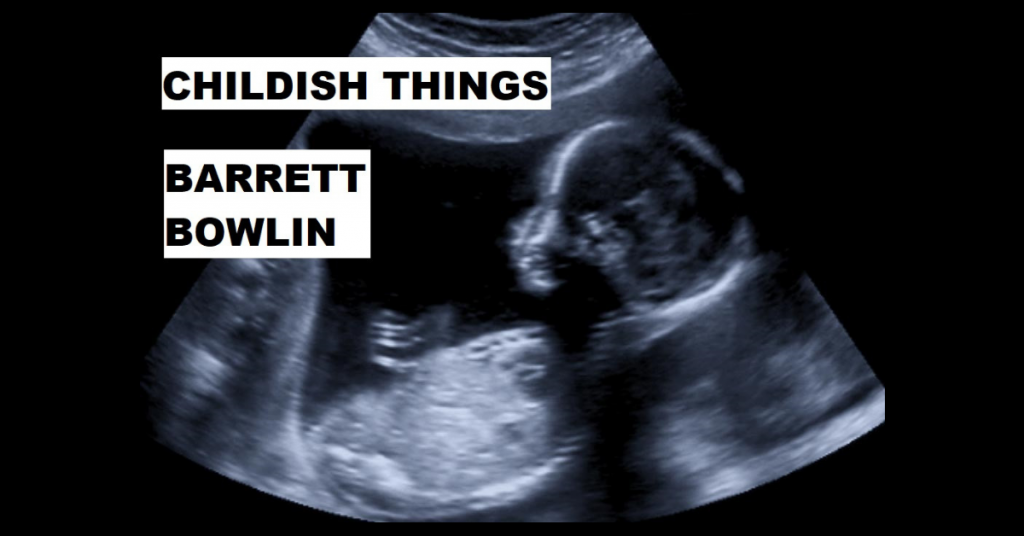Hours after I first hear her voice in line at the bank, I make peanut butter & jelly sandwiches for the both of us with tall glasses of cold milk, edible memories from decades ago, and then she and I move to the daybed, together, her voice as cozy and warm as a mother’s breasts.
“Point to something pink,” she says, my fingers on her chest.
Her voice is bright and clear, a sparkling peal of sound, a live version of the recording made for the Little Reader for Girls I remember having in second grade, the one that took four ‘C’ batteries. And she’s with me here, right now, warm and next to me in the nighttime.
“You found it!” she says, laughing.
You found it, the Little Reader would say, its rainbow push-button keypad worn down where I pressed my fingers.
She arches her back in my bed, cocks an eyebrow at me, says, “Point to something red.” In the corner of her mouth is a breadcrumb. I leave it where I find it and move my hand away from her lips.
“Super job!” she whispers, the crow’s feet at the edges of her eyes contracting. “That’s great!”
She’s tanned everywhere I can see, with the lines on her forehead stilled by clinic-grade botulinum, and she lives here in Santa Monica, I’ve learned, neighborhoods of stucco and adobe away from me, stringing a late retirement together off royalties from the recording sessions for toy companies like Hasbro and Fisher Price, from the studio work done for Mattel and Tyco and Disney. She drives a pink Mercedes she’s parked in my complex’s handicapped spot.
“It is great,” I say, blushing and happy after years spent away from the toy box. Somewhere over in Riverside, somewhere in my mother’s attic, next to the luggage my father didn’t take with him, the Little Reader for Girls’ batteries corrode in their slots, acidic and dusty.
We kiss. We touch. We stretch and pull toward each other like figurines. On the nightstand next to my bed, the glasses of chocolate milk are empty, just gray rings at the bottom and lip prints on the rims. “Do you remember any other lines from the Little Reader for Girls?” I ask.
“Did you know Mattel sold millions of that unit?” she says, finding the breadcrumb on her lips and flicking it onto my floor. She’s taken me up on an invitation, one stranger asking a favor of another while in line at the bank. Due for an appointment with her nephrologist first thing in the morning, she’s explained, this is a one-time thing, and we’ll have to be quick, so I wedge my hands under her skin.
“Can you find the letter ‘C’?” she says. The words come out like music through a warm speaker.
I breathe her in close and mumble out, “Thank you so much for this,” remembering Saturday afternoons spent in an oversized papazon, pushing letters and numbers and seeing LCD cells flash on and off while the voice behind the plastic belts out, That’s right! This will be over soon, this happy memory in the making, so I say, “Thank you for everything.”
She sighs after a sweet minute, rolls and turns away, and we stare at the flecks of white paint on my bedroom walls.
When she lifts up to fasten the clasp of her brassiere, she shoots a glance at her chain watch. It’s late. The cloth rises up her legs like sea foam from the Pacific.
“Sorry to bother you,” I ask, “but could you say, ‘It’s matching time!’ for me?”
The light from the neon outside glints on her fingernail polish as she clasps the front of her bra. She smirks at me before letting her lips curve down into a flat smile that says it’s time to go. I smirk back, abashed, somewhere years away from here, and I watch as a stray hair from her head wheedles up into the air, dances in a blizzard of dust motes only I can see from this angle.
“Please stay,” I ask. “I need this.”
“You all do,” she says as she clips her earrings back on, her voice turning and leaving away from me. “Every single one of you does.”

